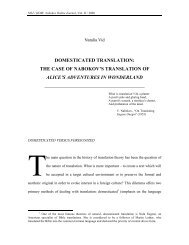Nabokov's Invitation to Plato's Beheading
Nabokov's Invitation to Plato's Beheading
Nabokov's Invitation to Plato's Beheading
- TAGS
- beheading
- etc.dal.ca
Create successful ePaper yourself
Turn your PDF publications into a flip-book with our unique Google optimized e-Paper software.
A. Moudrov. “Nabokov’s <strong>Invitation</strong> <strong>to</strong> Pla<strong>to</strong>’s <strong>Beheading</strong>”<br />
On the one hand, there are indeed many promising signs. Numerous passages<br />
emphasize Cincinnatus’ dual nature, so that it appears that his soul, simply put, will<br />
survive the destruction of his body. Thus at one point Cincinnatus is depicted enjoying<br />
himself after he casts off his material self. He “<strong>to</strong>ok off his head like a <strong>to</strong>upee, <strong>to</strong>ok off<br />
his collarbones like shoulder straps, <strong>to</strong>ok off his rib cage like a hauberk. He <strong>to</strong>ok off his<br />
hips and his legs, he <strong>to</strong>ok off his arms like gauntlets and threw them in a corner. What<br />
was left of him gradually dissolved, hardly coloring the air” (32). Since something still<br />
continues <strong>to</strong> exist apart from a heap of body parts on the floor suggests that Cincinnatus<br />
somehow survives his beheading as well. There are hints that the novel is narrated by<br />
none other than Cincinnatus’ own ghost who continues <strong>to</strong> exist at least as long as it takes<br />
<strong>to</strong> tell the readers about the events leading <strong>to</strong> Cincinnatus’ execution. This is what<br />
explains the mysterious exclamations “O horrible!” (12-3), which appear throughout<br />
Chapter One and are probably meant <strong>to</strong> evoke the speech of the King Hamlet’s ghost. As<br />
the latter describes the circumstances of his death <strong>to</strong> young Hamlet, he interrupts his<br />
monologue with a chilling “O horrible! O horrible! Most horrible!” (I.5.80). The<br />
narrative of <strong>Invitation</strong> <strong>to</strong> a <strong>Beheading</strong>, like the monologue of King Hamlet’s ghost,<br />
sounds like a bodiless voice which survived the death of its body. In yet another hopeful<br />
sign, the novel mentions that on the way <strong>to</strong> the place of the execution, Cincinnatus<br />
notices “the odor of warm nettles” and “a dozen geese” (214), undoubtedly a reference <strong>to</strong><br />
Andersen’s “Wild Swan,” a fairy-tale about a princess who is condemned <strong>to</strong> death for<br />
witchcraft. As she awaits her execution, she weaves a nettle-shirt for each of her twelve<br />
brothers <strong>to</strong> undo the spell of an evil witch that turned them in<strong>to</strong> swans (or, as some<br />
Russian translations have it, geese). She continues her work even on the way <strong>to</strong> her
















